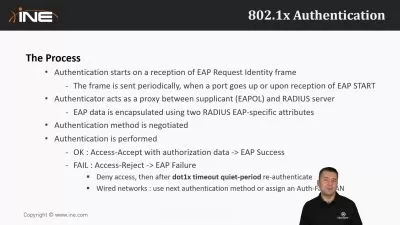Principles of Data Systems for IT Architects and Developers
IperContent Academy
2:39:38
Description
Unlock the Principles and Best Practices of Data Systems Design to Elevate Your IT Career
What You'll Learn?
- How to build applications that work
- Data Models and Query Languages
- Mechanisms for Storage and Retrieval
- How to transmitting data among IT systems
Who is this for?
What You Need to Know?
More details
DescriptionAre you an IT architect or developer looking to master the principles of data systems? This course is designed to elevate your expertise and career by delving into the essential aspects of data systems design and implementation.
In this course, you will explore four key sections that are critical for building robust, efficient, and scalable applications:
1. How to Build Applications That Work
Learn the foundational principles of building reliable and high-performing applications. This section covers best practices, design patterns, and architectural considerations to ensure your applications meet user expectations and business requirements.
2. Data Models and Query Languages
Dive into the world of data models and query languages. Understand the differences between relational and non-relational databases, and master the skills needed to design effective data models. Learn to use various query languages to interact with and manipulate your data efficiently.
3. Storage and Retrieval
Gain deep insights into the mechanisms of data storage and retrieval. This section covers different storage architectures, indexing strategies, and data retrieval techniques. You'll learn how to optimize storage solutions for performance and scalability.
4. Transmitting Data Among Systems
Explore the principles and practices of data transmission between systems. Understand the challenges and solutions associated with data integration, APIs, and messaging systems. Learn to design and implement efficient data communication strategies that ensure data integrity and consistency across your systems.
By the end of this course, you will have a solid understanding of the principles and best practices of data systems. You’ll be equipped with the knowledge and skills to design, build, and manage data systems that are robust, scalable, and efficient, propelling your IT career to new heights.
Join us and start mastering the data systems that power modern applications!
Who this course is for:
- IT architects
- Software developers
Are you an IT architect or developer looking to master the principles of data systems? This course is designed to elevate your expertise and career by delving into the essential aspects of data systems design and implementation.
In this course, you will explore four key sections that are critical for building robust, efficient, and scalable applications:
1. How to Build Applications That Work
Learn the foundational principles of building reliable and high-performing applications. This section covers best practices, design patterns, and architectural considerations to ensure your applications meet user expectations and business requirements.
2. Data Models and Query Languages
Dive into the world of data models and query languages. Understand the differences between relational and non-relational databases, and master the skills needed to design effective data models. Learn to use various query languages to interact with and manipulate your data efficiently.
3. Storage and Retrieval
Gain deep insights into the mechanisms of data storage and retrieval. This section covers different storage architectures, indexing strategies, and data retrieval techniques. You'll learn how to optimize storage solutions for performance and scalability.
4. Transmitting Data Among Systems
Explore the principles and practices of data transmission between systems. Understand the challenges and solutions associated with data integration, APIs, and messaging systems. Learn to design and implement efficient data communication strategies that ensure data integrity and consistency across your systems.
By the end of this course, you will have a solid understanding of the principles and best practices of data systems. You’ll be equipped with the knowledge and skills to design, build, and manage data systems that are robust, scalable, and efficient, propelling your IT career to new heights.
Join us and start mastering the data systems that power modern applications!
Who this course is for:
- IT architects
- Software developers
User Reviews
Rating
IperContent Academy
Instructor's Courses
Udemy
View courses Udemy- language english
- Training sessions 16
- duration 2:39:38
- Release Date 2024/09/18









